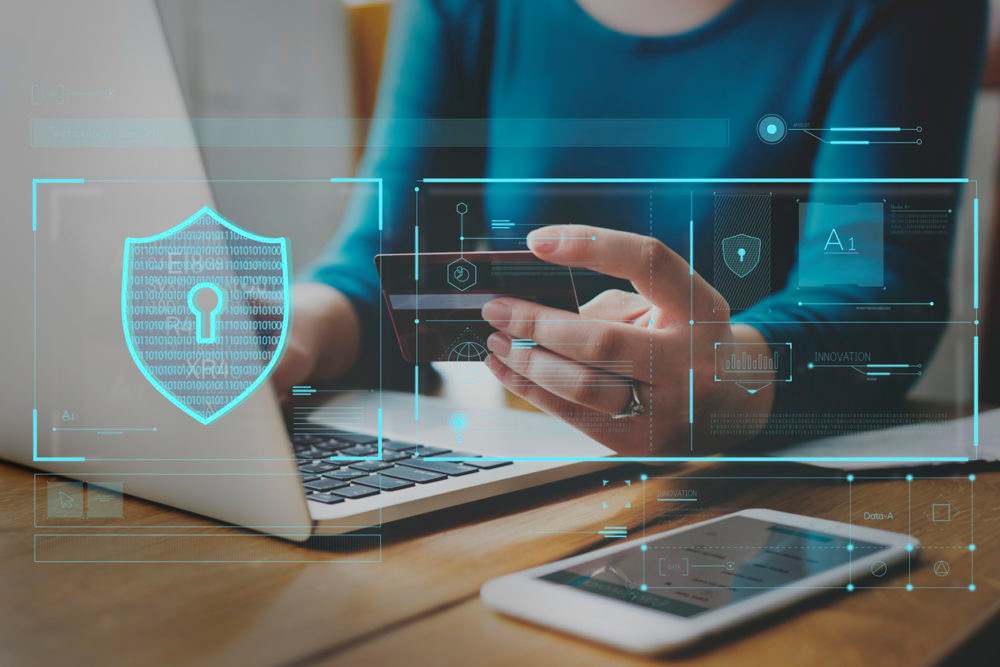Top Internet Privacy Tools to Protect Your Personal Info – Internet privacy tools can help you protect your digital privacy and your online reputation. Learn all about the leading tools for taking control of your personal information in the digital environment.
Almost every day of our lives in the digital era, we use computers for work, school, and entertainment. Computers and smart devices have transformed the way we interact with the world around us — for better or for worse.
Have you ever considered how much information about us is being collected as we visit websites, log into our digital accounts, or share files with friends and coworkers?
Internet privacy is a growing concern. Armed with the tools to protect your privacy in the digital environment, you can keep your data from falling into the hands of criminals. This guide will show you how.
Request a Free Consultation
What is Internet Privacy?
Internet privacy is the concept of having total control over what information about you appears online.
We use computers and mobile devices every day. Each time we use these devices, information is collected and stored. Everything from your web browser history and browsing habits to your credit card information, IP addresses, and purchasing history are collected.
Leading figures in the digital security industry and government have argued for stronger online privacy protection features. In some cases, laws have been passed to enhance our security and privacy, including:
- Electronic Communications Privacy Act (ECPA)
- Computer Fraud & Abuse Act (CFAA)
- Children’s Online Privacy Protection Act (COPPA)
- Controlling the Assault of Non-Solicited Pornography and Marketing Act (CAN-SPAM)
- Financial Services Modernization Act (GLBA)
Even with this patchwork of laws, your online security is not always perfect. It takes careful evaluation of your habits and implementation of specific privacy tools in order to keep your data safe.
How Does Your Private Data Wind Up on the Web?
We use computers in our personal and professional lives. Every time we fire up our web browsers or access online accounts, information is being exchanged.
The two leading sources of private data appearing on the web, however, are more visible than this behind-the-scenes information exchange between your internet service providers and browsers. Primary sources of private data are:
Public Records
The first source of personal data on the web is public records databases operated by government agencies. Public records laws often require agencies to post records online for public access. These records can include:
- Marriage records
- Property purchases and tax assessments
- Arrest records
- Mugshots
- Vehicle records
- Drivers license information
Public records can come from local, state, and federal sources. Unless you have a compelling legal reason, it can be difficult to get your personal details removed from these publicly-accessible databases.
Data Broker Sites
The second source of information is the huge collection of data broker and people-search sites. These websites scour public records databases, then republish the information they find on their own sites. Anyone can search by name, address, or location.
Data broker websites — including cheater sites, mugshot sites, and criminal records sites — have become incredibly popular in recent years. Often billed as entertainment sources and claiming to be champions of First Amendment rights, these sites love to post embarrassing information on celebrities, sports figures, and everyday people. Because these sites receive so much traffic, advertising companies have flocked to them. As a result, search engines like Google rank these sites at or near the top of search results pages.
Data Breaches
Whether intentional or accidental, data breaches cost billions of dollars in losses each year. Some of the world’s largest corporations have been victims of breaches.
Every time you conduct business online, personal information is collected and stored in digital databases. A data breach can affect thousands — even millions — of people. The data lost in breaches can include:
- Credit reports
- Bank account number
- Bank statements
- Driver’s license number and similar identification documents
- Financial statements
- Credit card number
- Marriage licenses
- Real estate transaction documents
- Tax documents from state tax agencies and the Internal Revenue Service
This information is then used to commit additional fraudulent activities. Identity thieves piece together the information they need from multiple sources. With personal identifying information, it is relatively easy to obtain credit or to create false identification documents in your name, potentially putting you and your family at financial risk.
How Can a Personal Data Breach Affect Your Online Reputation?
In your digital life, your online reputation is one of the most valuable assets you possess. Your reputation helps you open new doors of opportunity, or it can keep you from achieving your goals.
Imagine if a criminal gained access to your banking details or account login information. What are the effects these acts could have on your digital reputation?
First, you may lose credibility if someone were to impersonate you online, such as on a blog site or news outlet. Next, you could have your credit rating damaged if a criminal were to open fraudulent banking accounts. Since credit ratings are often checked by potential employers, a bad rating could mean that you miss out on that dream job.
These are only a couple of the many ways your reputation is at risk when user privacy is compromised in the digital environment. It is essential to protect your data; the following sections will provide the details you need to take control of privacy and security online.
Using a Virtual Private Network
A virtual private network, or VPN service, is a tool that creates a secure connection between your computing device and the internet. This is especially important if you use public WiFi networks when traveling for work.
VPNs provide end-to-end encryption of data between points, offering superior privacy in the digital environment. Some of the other advantages of using virtual private networks include:
- Hiding your web browsing history and browsing data from your internet service provider (ISP).
- Protecting sensitive data from interception.
- Protecting your physical location from discovery using your IP address.
- Allowing users to change online locations by spoofing or altering the IP address of the computer you’re using.
- Offering anonymity in the online environment.
Most of the popular VPNs on the market are user-friendly; you don’t need any special knowledge or skill to install and use them. Perhaps the only challenge is in the initial setup, where you may have to provide the IP address of a local DNS server.
VPNs work on any operating system, including Windows, Apple, and Linux. They also work with most browsers, including Google Chrome, Mozilla Firefox, Safari, and Internet Explorer/Edge.
As one of the most robust security solutions available, a VPN service is considered an essential tool for anyone who wishes to protect their online privacy. To enhance your privacy, you may consider adding a secure personal server that will allow you to control access from anywhere in the world. Only you know about your private server, but you can invite trusted friends or family to use it as well.
Password Management: Password Managers Pros and Cons
Most people have dozens, if not hundreds, of online accounts that they use in their daily lives. Each of these accounts requires login credentials, including a username and password. How can you keep track of all these passwords? The answer is a password manager.
What is a Password Manager?
A password manager is an app installed on your smartphone or computer that stores the passwords you use so that you don’t need to remember them. Many of the most popular managers on the market will also generate strong passwords for you to use on the accounts of your choice. On a free version of the tool, you may only get password storage, not password generation.
To use a manager, you must first log in with a “master” password. In some cases, there may be an additional authentication factor such as a security key or one-time code to input. From there, you can access your login credentials for your banking, social media, office productivity, and cloud-based accounts. The main benefit of this security tool is that it provides convenience.
Are There Drawbacks to Using Password Managers?
While these security tools offer convenience in storing and managing your login details, they are not without their risks. The potential drawbacks include:
- Single point of failure — if a criminal learns your master passcode, they will then have access to ALL of your logins for every site you’ve stored in the manager.
- Incompatibility across multiple devices — because managers are installed as apps on individual devices, you may not be able to use them interchangeably between devices, such as when you are traveling for work.
- Managers are a prime target of hackers, especially an open source password manager which gives criminals access to the code used to develop the manager.
Even with these potential drawbacks, managers for your passwords are still much safer than memorizing your codes — or worse, writing them down on post-it notes stuck to your home or office computer.
Secure Messaging Apps
As much as many of us love using instant messaging, social media platform apps like Facebook Messenger or Instagram are not private.
Criminals can gain access to your messaging services. From there, it is all too easy to spoof a person’s identity.
A secure messaging app uses a peer-to-peer network to encrypt data between two people. Encrypted messaging apps improve security and privacy, especially for those people who use instant messaging services for remote work.
Private Search Engines and Private Browsers
Internet traffic can reveal a lot about a person, including where they are, what they’re searching for, and what purchases they’ve made.
How do you protect your privacy and security while using a web browser? The answer is private search engines.
Private Search Engines
A private search engine works like any other search engine, except it doesn’t collect, store, or share the details of your search. One of the best features of such a security tool is that there is no ad tracking. You will see fewer targeted ads, and your future search results will not be influenced by previous searches.
What about the anonymous search engine tools provided by popular companies like Google’s “Incognito” mode? Unfortunately, these are anything but private. Information on searches won’t be stored on your local computer, but your ISP will still have access to your browsing history.
Private Browsers and Browser Extensions
A privacy focused web browser can be a tremendous help when you are worried about your privacy and security online.
Perhaps the most popular browser is the Tor browser, which uses multiple layers of security to hide your online activities. The Tor network is scattered across the globe; when you use it, you may be connected to nodes anywhere in the world, making it next-to-impossible to track you.
Just like the anonymous search tools, private browsers are user friendly and require no initial setup. You may even be able to install a private browser extension to your favorite web-surfing app, giving you better control over who can see you online. A browser extension that helps to protect your privacy is a valuable addition to your personal security suite.
Ad Blocking
While digital ads are not necessarily risky on their surface, these ads are often targeted to users based on their web browsing habits. In other words, advertisers often know what you are looking for and which sites you are visiting.
These advertisers use a tool known as “browser fingerprinting”, which collects information on browser type, operating system, plugins, time zone, and other metrics. Using this information, a criminal could potentially reverse-engineer a person’s identity.
Ad blocking software is one of the many security enhancements that can protect your privacy. When you block ads, you no longer face a constant barrage of advertisements on your favorite websites.
Some of the more popular privacy friendly search engines or browsers have ad blocking as a plugin or add-on service, making it easier than ever before to rid your browsing session of all those annoying ads.
Tips for Digital Privacy Protection
Every time we conduct business online, we put our personal information at risk of theft or loss. How can you protect this sensitive information and keep it out of the hands of criminals? Here are some tips for online identity theft protection from USA.gov, the official government organization website:
- When you visit your bank’s website, make sure you are safely connected to the legitimate site. Banks often use two-factor authentication to verify that it’s you before asking you to share details like your account number or other financial information.
- Think twice about posting personal identifying information on social media. Criminals often scour social accounts to get the details needed to commit identity theft — details like your dog’s name, your first car, or your children’s names.
- Regularly pull your credit reports from the major bureaus. Inspect them carefully to identify any credit card accounts or loans you don’t remember opening.
- Never share your login credentials with another person. Your friends or family members may not be as careful as you in protecting this information from loss.
- Install security-based browser extensions to help you eliminate many of the data risks you face online.
- Change your passwords frequently.
- Use complex passwords with special characters, numbers, and capitalized letters.
- Weak or duplicate passwords are a major source of data leaks. Don’t reuse your password between sites.
- A password manager can help you keep track of the passwords you use to access online accounts.
- Take advantage of any security features installed on your Windows computer or Apple operating system. These built-in tools can protect your private information from loss.
More Internet Privacy Tools
If you search on the web for information about digital privacy tools, you are likely to find hundreds of different choices.
Some of the leading tools include antivirus software, password managers, malware cleaners, and private search engine-based tools. Check the reviews on the Windows computers app store or in Google Play for details on how these tools can help you take control over your personal information.
Contact NetReputation Today
NetReputation is the leader in online reputation management. We have helped thousands of people establish, build, or repair a robust and positive digital footprint. In fact, the best internet privacy tools are used by our team to help protect clients from reputational threats.
Learn more about how to protect your digital privacy by contacting our content removal professionals today. Call NetReputation at 844-461-3632 or complete the online form below for a free consultation.


